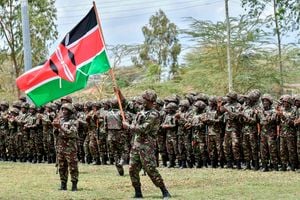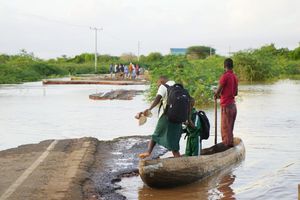Aflatoxin to hurt farmers’ prospects

Officials from the judiciary, Public health and National Cereals and Produce Board tour Ishiara depot in Mbeere district where nearly 40,000 bags of contaminated maize worth Sh83million was stored. PHOTO/GEORGE MUNENE
What you need to know:
- WFP may look elsewhere for maize under its purchase deal
Small-scale grain farmers in Kenya risk losing out from the World Food Program maize purchase deal due to contamination of grain by aflatoxin.
On Tuesday, the government raised the red flag after samples from last season’s harvest were found to be contaminated.
“While results of the final test are not yet available, it is only prudent to conclude that aflatoxin contamination is widespread and serious in Eastern and parts of Coast provinces,” said Prime Minister Raila Odinga.
High and dry
With indications that this might be replicated in other harvests around the country, farmers might be left high and dry as the food aid organisation gives them a wide berth.
Speaking to the Sunday Nation on the sidelines of the Africa Commodity Trade in Eastern and Southern Africa (ACTESA) in Lusaka, Zambia, a WFP official said they were monitoring the situation keenly. This, he added, would form the basis of their future purchase of grains from Kenya.
“WFP puts a lot of concern about safety and quality of the cereals that we purchase for the distribution to the vulnerable. With the realisation of aflatoxin in Kenya, we are likely to review the purchase,” he said.
Currently, WFP buys from Kenya an approximated 50,000 metric tonnes of cereals mainly maize but also sorghum and ground nuts.
Most of the farmers in this cadre are currently under an initiative called Purchase for Progress or P4P. Through this scheme, the organisation provides small-scale farmers access to fairer prices and a willing buyer.
More cash
It aims at putting more cash into the pockets of small-scale farmers and boost rural livelihoods.
Through this programme, WFP purchases food from growers in large quantities.
Although it tries to buy as much of its food locally, the organisation normally relies on commercial farmers or traders who can supply the large quantities that it needs.
However, the revelation of the contamination now puts the scheme in a rather precarious position WFP might be forced to source from elsewhere.
Great care
“Aflatoxin is health threatening and it, therefore, calls for great care in dealing with grain from Kenya. We have our officers on the ground conducting further tests,” he said.
The purchase for progress programme is one of the areas being utilised by ACTESA, a specialised agency for Comesa to offer market opportunities for smallholder farmers.
The situation can be improved through prudent post harvest handling of the grain. This would involve better drying and storage of the cereals by the farmers.




